Homage to Catalonia: the debate
3March 4, 2013 by Lydia Syson
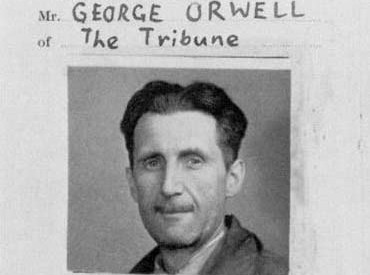
“You’ve written a book about the Spanish Civil War? Oh yes, Orwell, right?”
“Mmm. Yes and no.”
I’ve had a few conversations along these lines in recent months. It’s hard to explain George Orwell’s complicated relationship to the complicated Civil War in Spain and its complicated historiography in just a few words. As a teenager, I absolutely loved Homage to Catalonia – it was one of the books which first ignited my interest in the Spanish Civil War, and I’m hardly alone it that. I remember reading all Orwell’s novels too, in a great rush, and then as many of his essays as I could lay my hands on: ‘Politics and the English Language’ felt revelatory at the time.* In creating a character like my George – a journalist-turned-International Brigade volunteer – how could I not be interested in someone like Orwell, and the way in which he exchanged his typewriter for a rifle? But I also had plenty of reasons to avoid Homage to Catalonia while researching and writing A World Between Us.
Last Saturday’s Len Crome Memorial Lecture in Manchester was the perfect opportunity to clear my head about the man and his book with the help of an exceptionally knowledgeable panel of speakers. The audience was thoroughly engaged and well-informed too – an interesting mix which included many members of both the George Orwell Society (Eric Blair’s adopted son Richard among them) and the International Brigade Memorial Trust which was hosting the event. Like others there, I’d found great pleasure in re-reading the book in anticipation of the day’s discussion – there are few such vividly-written and captivating accounts.
I must admit that I’d expected a few fireworks. Homage to Catalonia is an account of Orwell’s experiences as a militiaman on ‘a quiet sector of a quiet front’ in Aragon during the early part of the Spanish Civil War. (You can see him standing head and shoulders above his comrades at the very back in the photograph above.) He also describes his part in the streetfighting that took place in Barcelona in May 1937 between different factions of the Loyalists who were also fighting Franco, and the subsequent banning of POUM, the Workers Party of Marxist Unification, and his own escape from Spain. Orwell had tried and failed to join the International Brigades before leaving London, ended up volunteering with a POUM militia, and was about to approach the International Brigades again when the May unrest erupted.
The first speaker, Richard Baxell, set out the ‘problem’ of Homage to Catalonia: it’s by far the most widely read memoir the Spanish Civil War, and the only book on the subject that many people will ever read. But as Orwell himself was first to admit, it offers only a very partial account of the war. ‘Beware of my partisanship’, he writes, ‘and the distortion inevitably caused by my having seen only one corner of events. And beware of exactly the same things when you read any other book on this period of the Spanish war.’ If you don’t read any other book, you’re left with a rather distorted impression of the war.
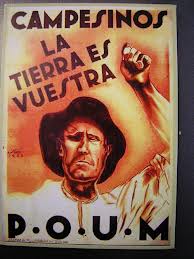 While Orwell was longing for more action, the 630 British volunteers of the 15th Battalion of the International Brigade were being annihilated at the Battle of Jarama. In A World Between Us, Nat is one of the relatively lucky ones. Only 80 soldiers were unscathed after the first three days of fighting. Not surprisingly, Orwell’s account of the crushing of POUM in Catalonia is rather different from the version International Brigade volunteers were given by the political commissars responsible for troop morale at these rather more active and depleted Republican front lines 250 km west of Barcelona. Equally unsurprisingly, and partly as a result of this, different readers, with different personal histories and different political leanings, tend to come to Orwell’s book with very different perspectives. Baxell discussed problems of morale in the Brigades and the difficulty any fighter at the front had in finding out exactly what was going on: the very issues of propaganda and censorship which are of such concern to George in AWBU. ‘It’s a war of words too’, he is told when he reached Madrid.
While Orwell was longing for more action, the 630 British volunteers of the 15th Battalion of the International Brigade were being annihilated at the Battle of Jarama. In A World Between Us, Nat is one of the relatively lucky ones. Only 80 soldiers were unscathed after the first three days of fighting. Not surprisingly, Orwell’s account of the crushing of POUM in Catalonia is rather different from the version International Brigade volunteers were given by the political commissars responsible for troop morale at these rather more active and depleted Republican front lines 250 km west of Barcelona. Equally unsurprisingly, and partly as a result of this, different readers, with different personal histories and different political leanings, tend to come to Orwell’s book with very different perspectives. Baxell discussed problems of morale in the Brigades and the difficulty any fighter at the front had in finding out exactly what was going on: the very issues of propaganda and censorship which are of such concern to George in AWBU. ‘It’s a war of words too’, he is told when he reached Madrid.
When questioned about the extent of Stalinist repression by the leaders of the Communist-recruited International Brigades in the aftermath of the Barcelona unrest – André Marty, the so-called ‘butcher of Albacete’ is often said to have executed hundreds – Baxell affirmed categorically that no British volunteers were executed for desertion. ‘Produce the bodies,’ he said. ‘We need to be led by the evidence.’
Paul Preston was due to be the next speaker. Sadly he 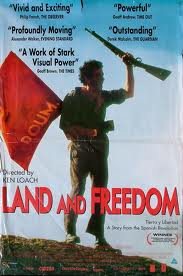 wasn’t well enough to come, but Jim Jump of the IBMT read his paper. You may have heard Preston’s ‘line’ on Orwell’s book last year on ‘Start the Week’ on Radio 4. It’s pretty brutal: he sees Homage to Catalonia as being about as relevant to the Spanish Civil War as Spike Milligan’s Hitler: My Part in his Downfall is to World War Two. ‘Marginal, if not perverse’ is Preston’s analysis of both Homage to Catalonia and the film it inspired, Ken Loach’s Land and Freedom. From Orwell’s worm’s-eye view as a lowly militiaman, he could hardly be expected to see the big picture. Preston portrays POUM as the sacrificial goat, slaughtered in Barcelona while the Basque Country was falling to the Nationalists.
wasn’t well enough to come, but Jim Jump of the IBMT read his paper. You may have heard Preston’s ‘line’ on Orwell’s book last year on ‘Start the Week’ on Radio 4. It’s pretty brutal: he sees Homage to Catalonia as being about as relevant to the Spanish Civil War as Spike Milligan’s Hitler: My Part in his Downfall is to World War Two. ‘Marginal, if not perverse’ is Preston’s analysis of both Homage to Catalonia and the film it inspired, Ken Loach’s Land and Freedom. From Orwell’s worm’s-eye view as a lowly militiaman, he could hardly be expected to see the big picture. Preston portrays POUM as the sacrificial goat, slaughtered in Barcelona while the Basque Country was falling to the Nationalists.
It was a great shame he couldn’t have been there in person to defend his robust views – clearly not shared by everybody present. I have a lot of sympathy with his frustration with the popularity of a book which has left so many readers convinced that the Spanish Republic was lost not because of the actions of General Franco, the intervention of Hitler and Mussolini, and the blind eye turned to this by Britain and other fellow-signatories of the Non-|ntervention Pact, but because of events in Barcelona and divisions on the left.
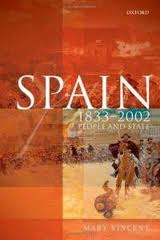 A slightly different perspective came from the conference chair, Mary Vincent, a historian of modern Spain currently working on religious violence in the Spanish Civil War, who could obviously only respond to the questions Preston’s paper provoked from her own point of view. Vincent emphasised just how deep the rifts in Spanish society were in 1936. She believes the very narrow margin of the Popular Front’s victory in the February 1936 elections made war inevitable. She also pointed out that though international volunteers were motivated by internationalist ideals, seeing the Spain’s war above all as an opportunity to stem the rising tide of European fascism, it’s important to remember that the war was at heart a civil war, waged in an utterly divided nation. Vincent re-reads Homage to Catalonia with her students every year, endlessly fascinated by the strikingly visual imagery used by a writer who didn’t speak the language of the country about which he was writing. She sees it above all as a narrative of political epiphany.
A slightly different perspective came from the conference chair, Mary Vincent, a historian of modern Spain currently working on religious violence in the Spanish Civil War, who could obviously only respond to the questions Preston’s paper provoked from her own point of view. Vincent emphasised just how deep the rifts in Spanish society were in 1936. She believes the very narrow margin of the Popular Front’s victory in the February 1936 elections made war inevitable. She also pointed out that though international volunteers were motivated by internationalist ideals, seeing the Spain’s war above all as an opportunity to stem the rising tide of European fascism, it’s important to remember that the war was at heart a civil war, waged in an utterly divided nation. Vincent re-reads Homage to Catalonia with her students every year, endlessly fascinated by the strikingly visual imagery used by a writer who didn’t speak the language of the country about which he was writing. She sees it above all as a narrative of political epiphany.
After lunch, Tom Buchanan – whose book The Impact of the Spanish Civil War on Britain was an important source for A World Between Us – spoke on the reception and impact of Homage to Catalonia. Tracing its publication history before and after the Second World War, he showed the surge of interest in the book that accompanied the cold war. From a literary point of view, Buchanan regards Homage to Catalonia as the best written eye-witness account of the war. Gamel Woolsey’s Death’s Other Kingdom was offered as a contender by a member of the audience. I would also suggest James Neugass’ recently published War is Beautiful. Both Woolsey and Neugass were poets.
Orwell names very few members of the Independent Labour Party from the group which fought alongside him. Christopher Hall, author 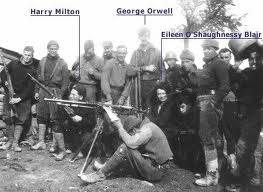 of In Spain with Orwell, filled in these gaps in the final talk of the conference. Stafford Cottman – represented by the Ian Hart character in Land and Freedom – was the original inspiration behind Hall’s work on the ILP volunteers in Spain. As fellow members of the ‘London Bureau’, an international affiliation of anti-Moscow revolutionary socialist parties, ILP-ers felt their first allegiance was to POUM rather than the government in Spain. It was fascinating to hear from Hall about the women who are barely mentioned by Orwell – such as his wife, Eileen, and Sybil Wingate, who went to the front in a militiaman’s uniform but was soon ordered back to Barcelona. After the war, Wingate castigated the British Labour movement for its failures in Spain, and worse, its smug complacency about this: ‘they say “very sorry boys.” We did our best but the government would not do what you wanted, and so Spain is lost, and a million of our comrades are dead. Isn’t it just too bad?”
of In Spain with Orwell, filled in these gaps in the final talk of the conference. Stafford Cottman – represented by the Ian Hart character in Land and Freedom – was the original inspiration behind Hall’s work on the ILP volunteers in Spain. As fellow members of the ‘London Bureau’, an international affiliation of anti-Moscow revolutionary socialist parties, ILP-ers felt their first allegiance was to POUM rather than the government in Spain. It was fascinating to hear from Hall about the women who are barely mentioned by Orwell – such as his wife, Eileen, and Sybil Wingate, who went to the front in a militiaman’s uniform but was soon ordered back to Barcelona. After the war, Wingate castigated the British Labour movement for its failures in Spain, and worse, its smug complacency about this: ‘they say “very sorry boys.” We did our best but the government would not do what you wanted, and so Spain is lost, and a million of our comrades are dead. Isn’t it just too bad?”
If you haven’t read Homage to Catalonia, I can’t recommend it more highly. But like Loach’s brilliantly-made film, it’s ‘a’ story, not ‘the’ story – a wonderful introduction to the passionate politics of the Spanish Civil War and a great stepping stone in the direction of further exploration.
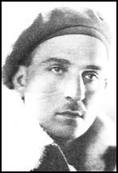 You can contact both the International Brigade Memorial Trust and the Orwell Society via their respective websites.
You can contact both the International Brigade Memorial Trust and the Orwell Society via their respective websites.
Who was Len Crome? A Latvian-born doctor living in Scotland who in December 1936 volunteered for a somewhat dubious outfit called the Scottish Ambulance Unit. By August 1937 Crome was Chief Medical Officer for the 35th Division of the Republican army. The interviews with Crome in the IWM sound collection hugely helped my understanding of the medical side of war while I was researching A World Between Us. He was clearly as charming as he was courageous, and I thoroughly enjoyed the hours I spent in the company of his voice at the Imperial War Museum library. Here’s a short autobiography, recording his life before and after the Spanish Civil War. Len Crome’s son Peter launched the discussions on Saturday with a few remarks made by his father which had particularly stayed with him. One of them was: ‘don’t always believe what old soldiers tell you.’
*Just a few years later, when I was a English student newly in thrall to 1980s developments in critical theory and post-structuralism, Orwell’s idea of language as transparent began to horrify me: ‘Good prose is like a windowpane’, he argued with his usual (apparent) precision and simplicity. I immediately embarked on an equally passionate phase of rejection of the writer I’d once so admired. Last month’s Salon featured a particularly interesting re-consideration of Orwell, while Henry Hitchings discussed his views on language on the Orwell Society website last year.
Category News | Tags: Barcelona, Christopher Hall, Franco, Homage to Catalonia, IBMT, ILP, Jim Jump, Len Crome, Mary Vincent, May Days, Orwell, Orwell Society, Paul Preston, POUM, quiet front, Richard Baxell, Spanish Civil War historiography, Stafford Cottman, Tom Buchanan

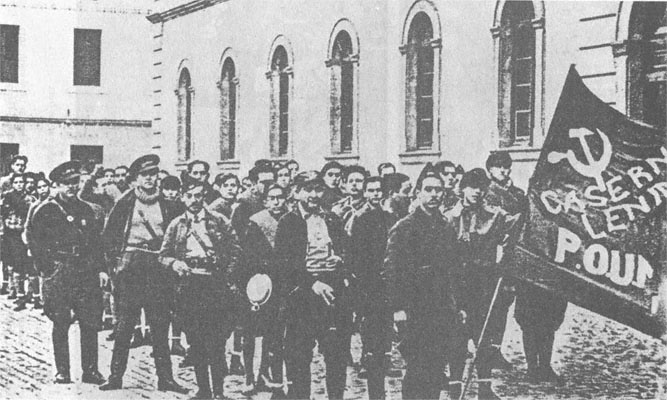

[…] For those who missed what was a very successful and popular event, the four lectures will be placed online and a short video of some of the highlights will be available on Youtube. In the meantime, Marshall Mateer has put some material on the IBMT’s Flickr site and Lydia Syson, author of A World Between Us, has written an account of the day on her blog. […]
Stafford Cottman is my grandads brother but I have very little information on Sattord as he and my grandad have passed away. If anyone has any information on Stafford or where I can track any information please inbox me. Many thanks Alan Cottman.
The report of the Lectures is now available on Flickr. See http://www.flickr.com/photos/ibmt/sets/72157632752026372/ There are 20 images and 8 mini videos – one for each of the speakers and one for the guests Peter Crome (son of Len), Quentin Kopp (son of Georges, Orwell’s POUM commander and Richard Blair (George and Eileen’s adopted son). The photo of Orwell and the machine gun has the names of some of the others present as given by Chris Hall in his presentation.